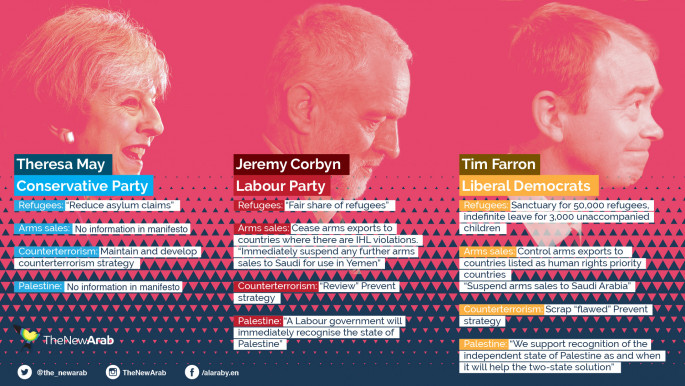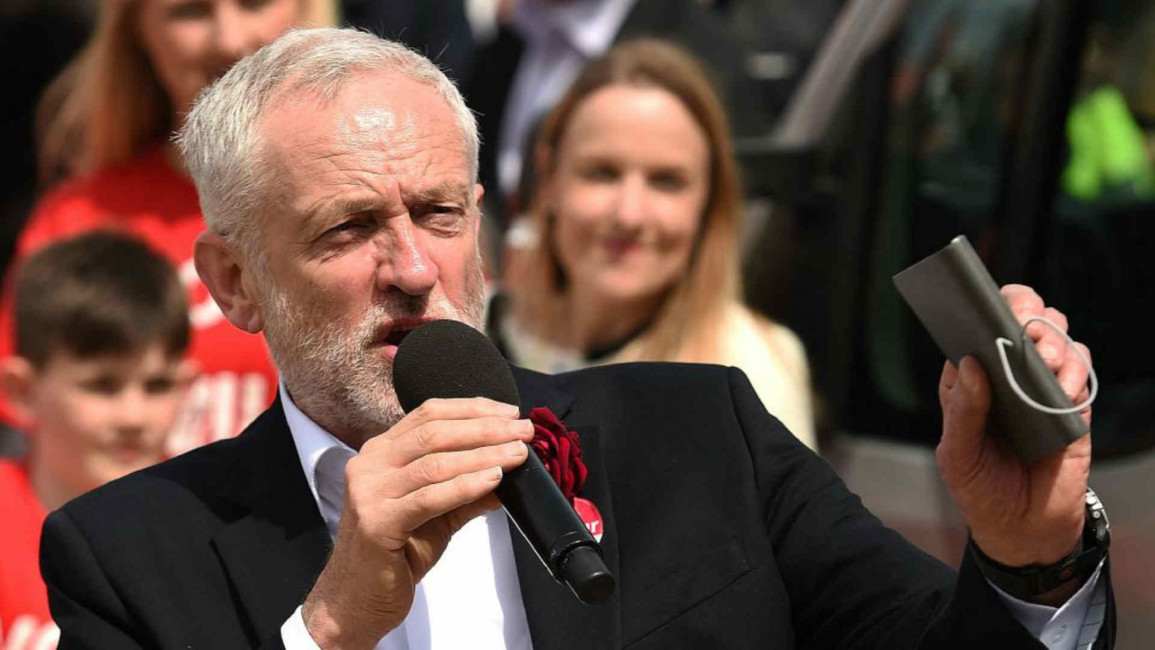
It's better to oppose Corbyn on international issues, than May both at home and abroad
This Thursday, Britain will be deciding who will get to lead the country in perhaps one of the most pivotal elections in recent memory due to Brexit.
As the vote rapidly approaches, Labour under Jeremy Corbyn has savaged the commanding Conservative lead after a number of disasters, such as Theresa May's backtracking over the "dementia tax" and her arrogant cowardice in refusing to debate the other party leaders.
What concerns me, however, are the comments I have increasingly seen on social media and in the columns of newspapers and websites, arguing that Britons who oppose the Tories should be hesitant to vote for Corbyn due to his views and policies on the Middle East.
In other words, people should not vote for either Corbyn or May, but for other, more "progressive" choices.
In my opinion, that line of thinking is sheer madness for anyone seeking to oust the Tories.
The argument against Corbyn
Some of the arguments of left-wing writers and social media activists against Corbyn can be neatly summarised as the Labour leader not having a monopoly on progressive politics domestically, while internationally, they claim, he is a supporter and even facilitator of dictators, extremist groups and rogue states such as Iran.
 |
|
I stand firmly opposed to Iran, but also to the pariah rump state run by the Baathist regime in Syria. I also stand diametrically opposed to the axis of sectarian terror embodied by Shia jihadist groups such as the Lebanese Hizballah, who have run amok across Syria and trained similar groups to wreak murder and violence in Iraq.
 |
Progressives everywhere should think long and hard before making further attempts to split an already tenuous electorate |  |
In terms of foreign policy, then, I entirely agree with these commentators about Corbyn's appalling record on the key crises of the modern day.
His demonisation of Saudi Arabia as a country that has "funded and fuelled extremist ideology" while having no problem appearing on Iran's Press TV betrays the kind of amoral leftist politics that has become characteristic of the bankrupt "anti-imperialist" movement.
As a conservative, though not in the "nasty party", such puerile thinking as believing that Libya would have been better off if dictator Muammar Gaddafi had been left to butcher his people offends my sensibilities. Corbyn's views on this - which are in line with the global left backed by Russia's Vladimir Putin - and many other international issues, induces nothing but loathing and revulsion in me.
Helping Tories win won't be better
Even with the above in mind, however, I will still be voting Labour. Apart from the fact that I do not believe the Tories' economic conservativism represents my own views, I can hardly say they would be better on foreign policy than Corbyn.
As a small example, and following the horrific attacks on London Bridge last weekend, Theresa May began harping on about Islamists again, without any attempt to quantify what she meant. She also failed to realise the irony that some of her key allies in the fight against the Islamic State group are in fact Shia Islamists themselves.
| Read more: Layla Moran: British-Palestinian, Liberal Democrat, and running for government | |
The Iraqi government that May calls an ally in the war on IS is heavily influenced by the Shia fundamentalists within its ranks. Under the Tories, Britain has not only given support to then-Prime Minister Nouri al-Maliki - who was responsible for sectarian atrocities occurring against Iraq's Sunni Arabs - but the government also decided to reopen the British embassy in Iran.
Let us not forget that it is Iran that has propped up the brutal regime of Bashar al-Assad in Syria, alongside Russia. Tory Britain helping the US under Obama to cut nuclear deals with Iran and lift sanctions in exchange for good behaviour failed to stabilise the Middle East or even curb Iranian excesses. Iran's behaviour has got worse, not better.
Vote for Corbyn, then oppose him
As a result, both parties' equally terrible international outlook means the choice of who to vote for boils down to domestic issues, and who will best right the ship in terms of social justice in Britain. For me, Corbyn's vision for the United Kingdom is one that is fairer in that it will seek to increase opportunity for the most vulnerable in our society, by asking those who are most fortunate to pay a little more.
This election is a two-horse race, and we should not be making any bones about it. Voting for other parties who also have policies that seek to introduce greater fairness will simply take votes and seats away from Labour, who are the only party that can prevent an outright parliamentary majority for the dystopian future of a "no deal" Brexit, continued cuts, surveillance and corporate tax havens of May's Conservatives.
 |
Both parties' equally terrible international outlook means the choice of who to vote for boils down to domestic issues |  |
As Yanis Varoufakis, the former Greek finance minister and leftist icon, recently said of the French elections in support for Emmanuel Macron over fascist leader Marine Le Pen: "I shall mobilise fully to help you… with the same strength that I shall be joining the… people's protest to oppose your government."
To that end, I believe that progressives everywhere should think long and hard before making further attempts to split an already tenuous electorate, no matter how much Labour are surging in the polls.
Corbyn in power, and being in a position to oppose him on international affairs is better than having May in power and having to oppose her on both domestic and foreign policy.
For me, the only option on June 8 is a vote to oust the Tories, on the understanding that, on June 9, we begin working to to pressure Corbyn to shift away from his disastrous foreign policy agenda.
Tallha Abdulrazaq is a researcher at the University of Exeter's Strategy and Security Institute and winner of the 2015 Al Jazeera Young Researcher Award. His research focuses on Middle Eastern security and counter-terrorism issues.
Follow him on Twitter: @thewarjournal
Opinions expressed in this article remain those of the author and do not necessarily represent those of The New Arab, its editorial board or staff.


![President Pezeshkian has denounced Israel's attacks on Lebanon [Getty]](/sites/default/files/styles/image_684x385/public/2173482924.jpeg?h=a5f2f23a&itok=q3evVtko)



 Follow the Middle East's top stories in English at The New Arab on Google News
Follow the Middle East's top stories in English at The New Arab on Google News


